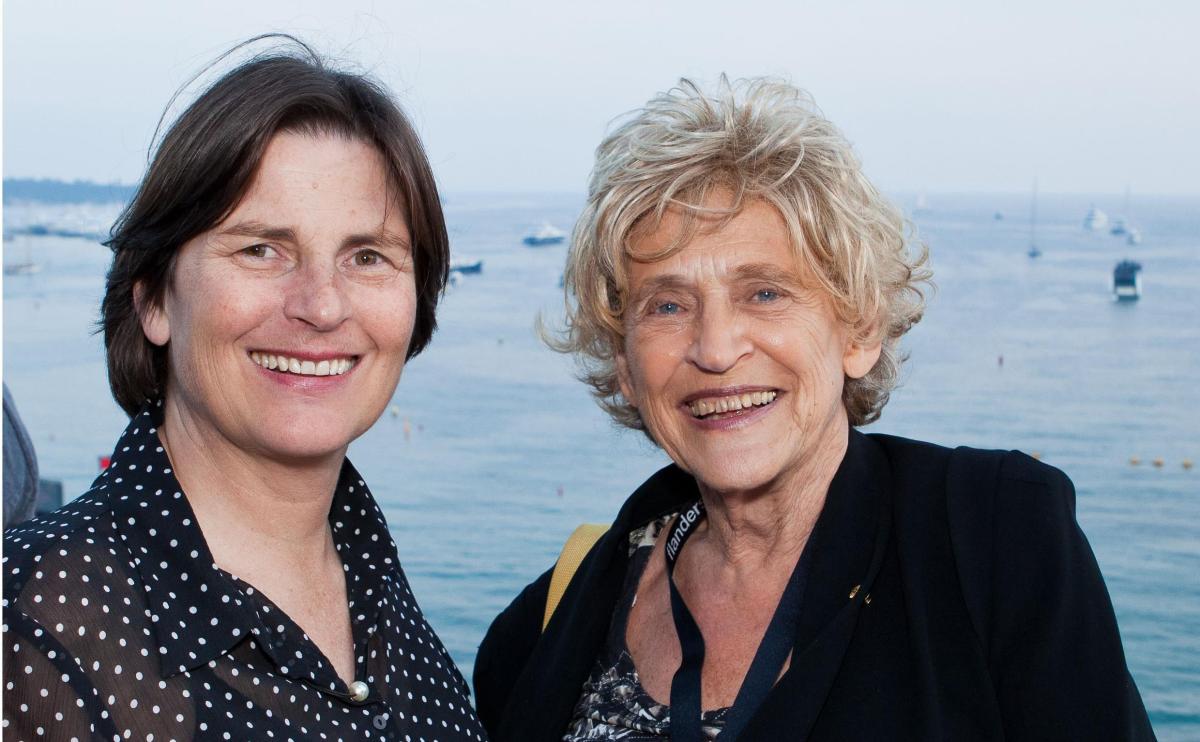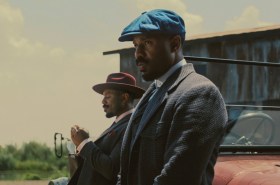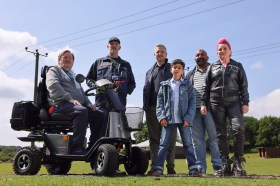When producer and distributor Sue Maslin AO thinks about the women who’ve inspired and mentored her during her extraordinarily successful 35+ year career, she thinks of ‘trailblazer’ Natalie Miller AO.
‘I love the story of Natalie in the 1960s, deciding to distribute Luis Buñuel’s surrealist film The Exterminating Angel,’ says Maslin on the phone to Screenhub. ‘That was the beginning of her distribution business Sharmill Films, and now she’s also got a really successful cinema with Cinema Nova in Melbourne. She’s like the Exterminating Angel of business!’
But it’s a worry, according to Maslin, that all these years later Miller still remains an anomaly. ‘Natalie Miller is the only female cinema operator in this country, and one of the few women who run a distribution business,’ she says. ‘To this day, she’s one of only two women who sit on the board of NACO (the National Association of Cinema Operators) and she’s used to being the only woman in the room when you get into the business side of things.’
Follow the money and you find the men
Why is it so important to have women in the business side of things? It hardly needs asking, but here’s the answer: ‘If you want to follow where power and leadership in industries reside, you have to follow the money,’ says Maslin, best known as the producer of the box office hit The Dressmaker, executive producer of Brazen Hussies, and co-founder of innovative distribution and rights company Film Art Media.
‘When you follow the money, you find the men,’ she says.
READ: Brazen Hussies celebrates the living history of Australian feminism
The need to have more women prepped for positions of power in the screen industry was the primary reason for the establishment of the Natalie Miller Fellowship (NMF), an annual $20,000 (previously $10,000) grant awarded to aspirational women to pursue professional and career-building leadership goals.
The idea was born back in 2010 when Maslin joined an an informal group of women including Chrissy Thomson (who was at the time retiring from her role at Sharmill), Annette Blonski, Jan Epstein, Jennifer Sabine, Zelda Rosenbaum and Heather Scott. Together they decided to raise funding towards the annual Fellowship, named in honour of Natalie Miller AO.
During Maslin’s tenure as NMF President (2013 – 2021) the Fellowship’s industry relationships and donations grew, leading to the doubling of the annual purse $20,000. Drawn from the world of distribution and sales, post-production, programming, exhibition and impact producing, the nine previous recipients are a potent and powerful list, though not the usual suspects of writers, directors and producers we’re accustomed to seeing held up as examples of female screen industry success.
Those alumni are: Rachel Okine (Managing Director, Aquarius Films); Harriet Pike (Head of Production & Development, WildBear Entertainment); Rebecca Hammond (Post Production Manager, Beyond Productions); Courtney Botfield (Head of Distribution & Sales, Bunya Productions); Sasha Close (Program Manager, Gold Coast Film Festival); Kristy Matheson (Director, Film Programs ACMI), Miriam Katsambis (Legal Counsel, Entertainment One); Anna Kaplan (Producer and Impact Producer, Greenfield Pictures); and Pauline Clague (Founder and Artistic Director of Winda Film Festival).
Stepping back from NMF and looking forward
As of May 15, Maslin has stepped out of the role of President of the NMF, making way for a successor who will be announced shortly. She says it’s the right time and the organisation is in great shape.
READ: Why be a producer? Sue Maslin, Owen Johnston and Gus Howard tell all
Merely applying for the fellowship has been good for women’s careers, whether they were the final winners or not. As per the media release, Maslin said: ‘I have now overseen the awarding of nine Fellowships since 2011 and am aware of the impact that it has had not only on the career journeys of the recipients, but all women who applied and went through a process of considering their career trajectory in a new way… The requirement to seek letters of support from industry mentors meant that women were having serious conversations about their leadership ambitions with employers and industry leaders, and this alone has led to career advancement for many – something I am very proud of.’
With WIFT, the Gender Matters Taskforce and NMF, Maslin has been energetic in contributing to the wider industry shift in the last ten years around the participation of women. It’s now the expectation, and a requirement, that any project funded by agencies will have women in key creative roles. But when it comes to the less visible but no less important roles in the business side of things, she says we still have too far to go.
‘We need to get women out of middle management and support roles, and into positions of leadership, you know, deciding the direction of this industry, deciding what gets made.’
Sue Maslin
We asked Maslin for advice for women around careers and business leadership. Her main wisdom is to back yourself, take a chance and think hard about what success means to you. She also gave us a taste of what’s next, because she’s ready to fight.
Screenhub: In the last ten years, do you think it has become easier for women to say, ‘I want to be a leader’?
Sue Maslin: Yeah, it used to be very very difficult for any woman to articulate that. And we have seen examples of women who did occupy positions of leadership back in the 90s and possibly in the 2000s. Many of them have just disappeared now, changed industries or retired or moved on, often with incredible resistance. Some of those women led major screen agencies, and were required to reapply for their own jobs in ways that the men weren’t. We’ve seen recent examples of that. And they were described as aggressive, as pushy, as not having good management styles, because they were firm and assertive. And for better or worse, there was a lot of negativity that sat around women in those leadership positions. I think that has definitely shifted over time.
Women have always been fairly well represented within government funded organisations, but I’m thinking more within the commercial sphere. So we’ve got Jane Hastings from Event Cinemas, there was Jo Bladen, Natalie herself in in the cinema area, and then in television, there are certainly more women now occupying the commissioning editor roles. We have Amanda Duthie now as a senior commissioning person at Stan, which is great. It’s more commonplace now. It’s a little bit more accepted. But if you look at the really key positions of who’s running the various corporations for distributors, the sales agents, networks, etc, outside of government funded agencies and broadcasters it is still very, very heavily dominated by men. That’s the thing that we really need to shift. We need to get women out of middle management and support roles, and into positions of leadership, you know, deciding the direction of this industry, deciding what gets made.
‘we have a twenty-two and a half billion dollar screen industry. Where’s all that money going? I can tell you, it’s mostly men who decide where it ends up.’
Sue Maslin
Lots of those blokes will say, ‘Oh, we’ve got lots of women, we love women, we’ve got women on our team, our marketing team, our second in command. But those women are not on the boards, they’re not at the level deciding who spends the money. You know, we have a twenty-two and a half billion dollar screen industry. Where’s all that money going? I can tell you, it’s mostly men who decide where it ends up.
What are some of the key skills or qualities that women themselves could work on to do to develop their leadership skills ?
One of the big ones is confidence. Women need to have the confidence to feel that they can really pursue their career development or their leadership ambitions. They need to feel that confidence at a time where they’re needing to make a step. That requires a level of courage and confidence, where you haven’t necessarily done the job before, but you’re going to back yourself and give it a try.
‘As we know from extensive research, women typically will almost need to know how to do the job before they’ll actually apply for the job. It’s very difficult for women to take the leap of faith.’
Sue Maslin
As we know from extensive research, women typically will almost need to know how to do the job before they’ll actually apply for the job. It’s very difficult for women to take the leap of faith.
What are some common mistakes women make?
Women have a propensity for thinking that if you work hard enough, and you do more courses this will prepare you for the job. Whereas the guys don’t think along these lines. The guys will take the leap, they’ll have three out of the 10 job requirements, and they’ll still go for the job.
Women do themselves a disservice by feeling ‘oh no, I need to get more experience, more training, do another course, another workshop,’ before they’ll tackle something that would actually really help advance their careers.’
Where did you personally get your confidence and courage from?
In part, I’ve had to learn along the way, I certainly didn’t step into the Natalie Miller fellowship thinking at all that I would end up being with it for this long and that I would be the President. It’s only become possible because I’ve been the beneficiary of fantastic support and encouragement and mentorship along the way. So that’s a big part of it.
But sitting underneath all of that, I think, is the fact that I grew up in the country and I was able to learn very practical ways of how to get on with things. I learnt resilience, and I had an unbelievably supportive family, particularly a supportive mother, who encouraged me to tackle things and to know that it was possible to do anything, really.
Are there any particular kinds of people that you would like to see applying more for the fellowship? Are you getting a diverse spread of applicants?
No, I feel that at the moment we’re not getting sufficient applications to really reflect the diversity that is demanded by audiences, and demanded by our screen culture. We’re starting to see that diversity creatively. It’s fantastic that we’re starting to see more writers, producers, directors coming from diverse backgrounds. And there’s all sorts of programs to encourage that on a creative level, but I think it’s still lagging in looking at leadership. We definitely need far greater diversity on all of our screen agency boards, our commissioning, on panels and amongst the television networks.
Read: Three killer mistakes women make in promoting their work
At the end of the day, the whole point of the Fellowship was to shine the spotlight on the question, ‘Who gets to decide what programs are greenlit into production?’ And then ultimately, ‘What is greenlit onto our screens?’ And at the moment, in both of those instances, we do not have enough women, and we certainly don’t have enough diversity. And that’s the real challenge going forward.
To make a gross generalisation, do you think women are more reticent to really engage with the financial side of the business as opposed to the creative side?
I do. I think everybody in the business has a passion for this industry. And you have to otherwise you wouldn’t last. That’s just a truism. But I think women too often get caught up in it for the love and not the money, in that passion driving their decisions.
in terms of what success means to me, is just being able to have a sustainable creative life, to be able to keep doing the things you love, but do it in a financially sustainable way over time.
Sue Maslin
When I do teach Creative Leadership, which I’ve been doing over the last number of years, one of the things I really encourage student to do is just really think about, ‘What does success mean? In what shape might it take for you?’ Because it’s going to be different for everyone. But actually, you also need to be thinking about financial success. And, you know, at the end of the day, from my perspective, yes, I’ve had films that have performed incredibly well, I’ve had films that have been incredibly meaningful, but in terms of what success means to me, is just being able to have a sustainable creative life, to be able to keep doing the things you love, but do it in a financially sustainable way over time.
So yeah, I do think having leadership skills means you have to seriously think about this business, as not just solely creating great programs, great films, for audiences, which is of course what we all want to do, but actually thinking of the business around it and being more entrepreneurial. That’s the challenge to women, and we do have to be better at it.
What kinds of things do you teach in the Compton Creative Leadership course?
You have the best chance of success if you can align your values, and what’s driving you, to what you’re making. So you need to be asking, ‘what really matters to you?’.
Too often, particularly as women, we think our career is a bit of luck, and a bit of opportunity, and people helping along the way.
Too often, particularly as women, we think our career is a bit of luck, and a bit of opportunity, and people helping along the way. And it’s pretty haphazard. We just go from one project to the next, one step in our career to the next, falling from one thing to another. My challenge is to say, actually, no, you can have a lot of agency in that if you really start thinking about it. [You need to have] a really clear idea of what you’re doing, why you’re doing it, what your vision is, and then strategising around that.
You’ve been a crusader for increasing audience engagement with Australian feature films over a long period. Is this your next big focus?
I do feel really strongly about it and it’s my next passion. I’ve been involved with the Australian Screen Feature Summit, which is a group that’s for the first time bringing producers, distributors, exhibitors and agencies together to talk. It’s insane that in our business, we are all involved in the same project, that is getting our stories on screen out to audiences, but most producers have not spent time with exhibitors. Most exhibitors have no say in what gets greenlit or not, and yet, they’re the ones that are at the coalface, seeing everyday punters make the decision about what they’re going to see or not. I want to shift that dynamic. I’ve Been working in this group over the last two years, and we’re gearing up to put something together to present later this year.
We’ve got this tiny window where Hollywood has been out of the market now for a year. And Australian films have gone into the market and Australian audiences have found them going, Wow, we like this stuff. So we’ve got to build on that and not just go back to what it was like pre-COVID which is where Australian films summarily just disappear after a few weeks, which is a tragedy. I’ve spent a lot of time with exhibitors. And I promise you, most of them are just as passionate about Australian movies as we are. I really want to harness that passion more effectively. So watch this space.
Find out more about the Natalie Miller Fellowship.
This article was originally published 1 June 2021.






